Discover the winners of the ARE Photo Contest
On 21 May 2024, the winners of the ARE Photo Contest: “Impact of Team Europe’s Efforts in DRE” were announced during EAIF 2024. Throughout April, ARE, supported by GET.invest, launched a photo contest amongst its members to showcase the impact of Team Europe’s investments in decentralised renewable energy (DRE) on Sustainable Development Goals (SDGs) 7, 8 and 12.
ARE welcomed photos taken in sub-Saharan Africa depicting images from the following five categories:
- Productive use: DRE solutions enabling the creation of income in communities.
- Women Empowerment: DRE training and solutions allowing women to learn new skills and be included in the job market.
- Powering Industries: DRE technologies powering industries.
- Manufacturing & Power Components: Production of materials and components included in DRE technologies.
- Green Job Creation: Direct impact on job creation through the development and installation of DRE technologies.
These are the five winners:
1. EASI-WATER, EASY-PAY: Enabling Malawian smallholder farmers to approach farming commercially
Category: Productive use
Credit: EDP (Daniel Rodrigues)
Year: 2023
Location: Malawi
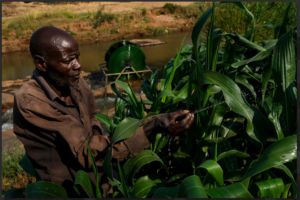
EDP, though its A2E Fund, has supported aQysta, an irrigation Dutch company that operates in Malawi. They develop hydro-powered pumps powered by flowing water and require minimal maintenance as they only have one moving part. aQysta has installed 45 Barsha pumps and five solar pumps and initiated a farm incubator to support local farmers.
aQysta creates significant value for society by reducing the environmental impact of agriculture and empowering farmers. Barsha Pump requires less labour and physical intensity than traditional farming methods, reducing the time needed for irrigation and increasing productivity and the quantity of produce that can be sold.
The photo shows Pearsons Sabiti using one of the Barsha pumps. Before he could only do his farming activities in the rainy season, but, after joining the farm Incubator Training Programme, he could start using the pump, which allowed him to farm during the dry seasons. Thanks to the pump, he expanded his farm and grew new crops, which he could sell and generate income from.
2. Solar cooling units for herbal farm
Category: Women empowerment
Credit: Phaesun GmbH
Year: 2023
Location: Kenya
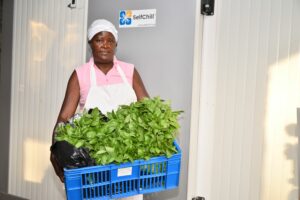
The pilot project installed the first SelfChill Cold Room, a concept developed by Phaesun that consists of cooling units powered by solar PV. The cooling units efficiently create the cold that is stored in the water chiller. Via a water/air heat exchanger, the cold is transported to the cold room, where any kind of produce can be stored with temperatures of down to 4°C.
Since the installation, the family business “Jungle Harvest”, which grows herbs such as basil, mint and coriander for sale, has been able to harvest them during regular daytime working hours and store them up to five days before distribution agencies pick them up to export and distribute around Kenya. It has also allowed them to create 10 permanent jobs, mainly for women in the community.
This photo shows a woman holding some of the basil plants that have been preserved thanks to the cooling units installed.
3. Sustainable solutions: solar-powered water infrastructure in Bamako
Category: Powering industries
Credit: Asantys Systems GmbH (Nicolas Rohrer)
Year: 2023
Location: Mali
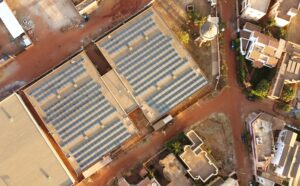
In this project, Asantys collaborated with SOMAPEP SA (Société Malienne de Patrimoine de l’Eau Potable), whose mission is to build the hydraulic infrastructures which include production, storage and distribution facilities, to ensure sustainable access to drinking water for Mali’s urban populations. The aim of this C&I project (of 300 kWp) was to power a water storage plant (which supplies water to the city of Bamako) with renewable solar electricity.
This outstanding aerial shot done with a drone shows the solar panels that allow the storage of solar energy that powers the water storage plant.
4. Rural electrification in Senegal
Category: Manufacturing & Power Components
Credit: Off-grid Europe (Tom Lunk)
Year: 2024
Location: Senegal
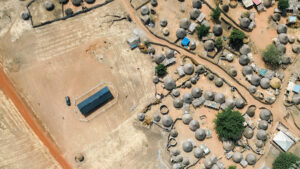
Off-Grid Europe has designed and built mini-grids for the ASER300 rural electrification project in Senegal, an initiative developed by the Institute ASER. Off-Grid Europe’s goal is to provide the best quality solutions and to bring real added value to the local population.
Their mini-grids are designed to withstand the most extreme conditions with the longest lifespan possible. They work with Lithium Iron Phosphate (LFP) batteries that are renowned for their safety, extended cycle life, and consistent performance. Additionally, Off-Grid Europe engineers their metal structure for mounting the PV panels, called ‘Sun Hat’ and provides energy monitoring and control with their smart software solution, the Off-Grid Controller.
This aerial shot shows the mini-grids installed in Kedougou region, which expanded energy access and boosted their economic and community development.
5. Construction works of a mini-grid
Category: Green Job Creation
Credit: ENGIE Energy Access (Yula Mwandamena)
Year: 2023
Location: Benin
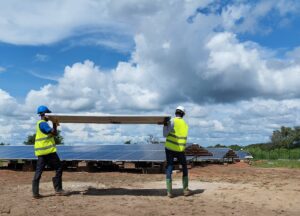
ENGIE Energy Access is constructing and will operate 20 additional mini-grids across Benin. These mini-grids, co-financed by the Millennium Challenge Account – Benin II programme as part of the Off-grid Clean Energy Facility (OCEF), will collectively deliver 1.2 MW of installed capacity, illuminating the lives of more than 30,000 people across 20 rural localities.
This project will accelerate energy access solutions in Benin, where ENGIE Energy Access is bringing light and sustainable electricity to already more than 1,500,000 people. It is also allowing the creation of jobs and thus, contributing to the economic development in the region.
The photo shows two operators installing one of the mini-grids commissioned by ENGIE.
